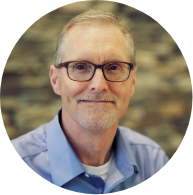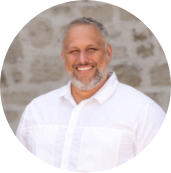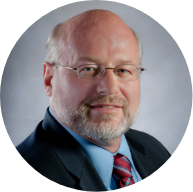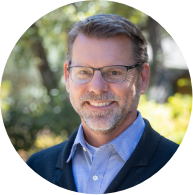
Phil Herndon
MA, LPC-MHSP, NCC
Phil worked in the trucking industry as a young adult until finally realizing his true passion was helping people walk through difficulties and heartache. He completed graduate school in 1992 with a Master of Arts degree in counseling and a Master of Arts degree in religious education. He served as a pastor in Texas for many years until relocating to Tennessee. Phil became the Clinical Director and co-owner of River Tree in 2020 and joined Tin Man Ministries as Clinical Director in 2023. He loves his role in developing, encouraging, and equipping the staff as they walk with people through their life journeys, and equipping the church for the work of the ministry. He is the co-author of The Voice of the Heart Bible Study and leads workshops at churches across the country.
Phil lives in Tennessee with his wife Sheila.

J. Scott Duvall
PhD
Scott is the Fuller Professor of New Testament and Chair, Department of Biblical Studies and Theology at Ouachita Baptist University. He grew up in Crowley, Texas and attended Ouachita Baptist University (1976-1980) where he majored in Business Administration and Economics. After being called to vocational Christian ministry, he attended Southwestern Baptist Theological Seminary, where he completed his MDiv (1984) and PhD degrees (1991).
Scott began teaching at Ouachita in 1989, serving as the first dean of the Pruet School of Christian Studies from 1999-2007, before returning to the classroom full time. He has been named the Ouachita Professor of the Year multiple times, making a lasting impact on his students, teaching and mentoring them as they transition to adulthood.
Scott has authored or co-authored at least fifteen books and numerous articles, including Grasping God’s Word: A Hands-On Approach to Reading, Interpreting, and Applying the Bible (4th ed. in 2020), God’s Relational Presence: The Cohesive Center of Biblical Theology (2019), and Experiencing God’s Story of Life and Hope: A Workbook for Spiritual Formation (2008). He is currently working on the Revelation volume in Zondervan’s Biblical Theology of the New Testament series. His research interests include Spiritual Formation, Biblical Interpretation, and the book of Revelation.
He and his wife, Judy, were married in 1982 and they have three daughters.

Nathan Wagnon
DMin
Nathan Wagnon is the Co-Founder and Chief Executive Officer of Eden Project, a non-profit organization dedicated to retraining people to connect deeply with God, self, and others. Nathan received his BA in Biblical Studies from Ouachita Baptist University (2001), and his ThM from Dallas Theological Seminary in New Testament Studies (2006). Following seminary, he joined the U.S. Army as an infantryman and deployed twice to Afghanistan in support of Operation Enduring Freedom (OEF X, XII). During his time in the military, he co-authored a mentoring book for young men titled Checkpoints: A Tactical Guide to Manhood (NavPress).
In 2013 Nathan moved his growing family back to Dallas and joined the staff of Watermark Community Church as the Director of Equipping & Apologetics. During his time at Watermark, Nathan earned his Doctor of Ministry (Discipleship) degree from Talbot School of Theology, Biola University, focusing on how people emotionally experience God, and how that unique relational dynamic either encourages or suppresses spiritual formation. After 9 years of vocational ministry, he transitioned off Watermark’s staff to start Eden Project in 2022.
Nathan is married to his wife, Margaret. They have four children: Nate, Miles, Jules, and Joy.

Richard E. Averbeck
PhD
Richard Averbeck is the Professor Emeritus of Old Testament and Semitic Languages, Trinity Evangelical Divinity School, in Deerfield, IL. After his graduation from Calvary Bible College (Kansas City) in 1974, he went on to Grace Theological Seminary in Winona Lake, Indiana (MDiv 1977). From there he moved to Philadelphia, Pennsylvania to pursue a Doctor of Philosophy in Ancient Near Eastern Studies and Biblical Hebrew at the Dropsie College for Hebrew and Cognate Learning (PhD 1987), now known as the Annenberg School of Judaica at the University of Pennsylvania.
In 1980 Richard moved back to Grace Theological Seminary where he took a position as a Professor of Old Testament Studies and taught until 1990. Richard also has an MA degree in Counseling from Grace in 1989. From 1990 to 1994 Richard taught at Dallas Theological Seminary, and then moved to Trinity Evangelical Divinity School, Deerfield, Illinois, where he has been teaching Old Testament and Ancient Near Eastern studies for the last 29 years.
Richard publishes in the fields of Hebrew and Old Testament Studies (especially the Pentateuch), Biblical Theology, Ancient Near Eastern History, Languages, Literature, and Religion (Sumerian, Akkadian, and Ugaritic), the relationship between ancient Near Eastern Studies and the Old Testament, as well as Spiritual Formation, and Counseling. Among his other works, he is the author of the recently released book, The OT Law for the Life of the Church: Reading the Torah in the Light of Christ (InterVarsity Press, 2022).
Richard and his wife, Melinda, have two sons (Nathan and Micah), and two grandsons (Levi and Orion).

Steve Porter
PhD
Steve L. Porter is Senior Research Fellow and Executive Director of the Martin Institute for Christianity & Culture at Westmont College. He also serves as an affiliate Professor of Theology and Spiritual Formation at the Institute for Spiritual Formation and Rosemead School of Psychology (Biola University). Steve received his Ph.D. in philosophy at the University of Southern California under Dallas Willard and M.Phil. in philosophical theology at the University of Oxford.
Steve teaches and writes in Christian spiritual formation, the doctrine of sanctification, the integration of psychology and theology, and philosophical theology. Steve has co-edited Psychology and Spiritual Formation in Dialogue (IVP), Neuroscience and the Soul (Eerdmans), and Until Christ is Formed in You: Dallas Willard and Spiritual Formation (ACU Press) as well as authoring other books and articles. Steve also serves as editor of the Journal of Spiritual Formation and Soul Care.
Steve is married to his wife Alicia and they have two children, Luke and Siena.